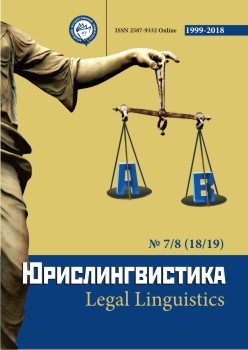ON INCORRECT USAGE OF MEDICAL TERMS IN THE DEFINITION OF SEXUAL OFFENCES IN THE CRIMINAL CODE OF THE RUSSIAN FEDERATION
Abstract
The article is devoted to the issue of the correct usage of medical terms in the definition of sexual offenses. The author analyzes the relevance of describing such offences with the terms: «sexual intercourse», «sodomy», «lesbianism», «other acts of a sexual nature». The definition is given from a medical and legal point of view. The author speaks about the incorrectness of their usage in the text of criminal law because of different understanding of these terms in medicine and in law. The structure «other acts of a sexual nature» is criticized. There is uncertainty in the definition of offences because the list of such actions is open and unlimited. For this reason, the problem of distinguishing the terms «other sexual acts» and «sexual abuse» is difficult to resolve. They are not defined in law, and medical science does not use them. The author draws attention to the fact that the title of Article 134 of the Criminal Code is broader than its content. As a solution to these problems, it is proposed to abandon medical terms atypical for the law in the definition of sexual offenses. As an alternative to the current concept, the terms «acts of a sexual nature associated with penetration into the body cavity of the victim» and «acts of a sexual nature that are not related to penetration into the body cavity of the victim» are suggested. As a result of such changes, there will be no need for terminological separation of «sexual intercourse», «sodomy», «lesbianism» and subsequent clarification of their content. Such an approach, in the author's opinion, will allow to build a logical and consistent system of crimes that encroach on sexual freedom and sexual inviolability.
Downloads
Metrics
References
Общая сексопатология: руководство для врачей / под ред. Г. С. Васильченко. М., 2005.
Конева М. А. Особенности квалификации насильственных действий сексуального характера, совершаемых гомосексуальными девиантами. Следователь. 2002. № 5. С. 10–14.
Изотов Н. Н. Уголовная ответственность за насильственные действия сексуального характера: автореф. дис. … канд. юрид. наук. Ставрполь, 2000.
Цэнгэл С. Д. Квалификация насильственных действий сексуального характера (ст. 132 УК РФ): автореф. дис. … канд. юрид. наук. СПб., 2004.
Андреева Л. А. Квалификация изнасилований. СПб., 1999.
Тыдыкова Н. В. Уголовно-правовая характеристика и вопросы квалификации насильственных половых преступлений. М., 2013.
REFERENCES
General sexopathology: a guide for doctors / ed. G. S. Vasilchenko [Obshchaya seksopatologiya: rukovodstvo dlya vrachej / pod red. G. S. Vasil'chenko]. Moscow, 2005.
Koneva M. A. Features of qualification of the violent actions of sexual character made by homosexual deviants [Osobennosti kvalifikacii nasil'stvennyh dejstvij seksual'nogo haraktera, sovershaemyh gomoseksual'nymi deviantami]. Investigator. 2002. № 5. Pp. 10–14.
Izotov N. N. Criminal liability for violent acts of a sexual nature: author. dis. ... kand. the faculty of law. sciences' [Ugolovnaya otvetstvennost' za nasil'stvennye dejstviya seksual'nogo haraktera: avtoref. dis. … kand. yurid. nauk]. Stavropol, 2000.
Cengel S. D. Qualifications the violent acts of a sexual nature (article 132 of the criminal code of the Russian Federation): author. dis. ... kand. the faculty of law. sciences' [Kvalifikaciya nasil'stvennyh dejstvij seksual'nogo haraktera (st. 132 UK RF): avtoref. dis. … kand. yurid. nauk]. St. Petersburg, 2004.
Andreeva L. A. Qualification of rape [Kvalifikaciya iznasilovanij]. St. Petersburg, 1999.
Tydykova N. V. In. Criminal-legal characteristic and qualification matters violent sexual crimes [Ugolovno-pravovaya harakteristika i voprosy kvalifikacii nasil'stvennyh polovyh prestuplenij]. Moscow, 2013.
Copyright (c) 2018 Юрислингвистика

This work is licensed under a Creative Commons Attribution 4.0 International License.
The authors, which are published in this journal, agree to the following conditions:
1. Authors retain the copyright to the work and transfer to the journal the right of the first publication along with the work, at the same time licensing it under the terms of the Creative Commons Attribution License, which allows others to distribute this work with the obligatory indication of the authorship of this work and a link to the original publication in this journal .
2. The authors retain the right to enter into separate, additional contractual agreements for the non-exclusive distribution of the version of the work published by this journal (for example, to place it in the university depository or to publish it in a book), with reference to the original publication in this journal.
3. Authors are allowed to post their work on the Internet (for example, in a university repository or on their personal website) before and during the review process of this journal, as this may lead to a productive discussion, as well as more links to this published work (See The Effect of Open Access).











